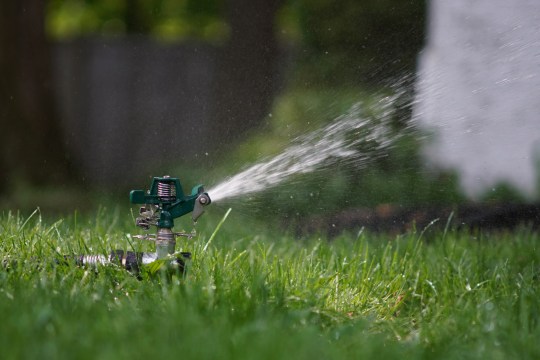Don't wanna be here? Send us removal request.
Text
The Future of Landscaping: Smart Lawn Sprinklers and IoT Integration

Traditional lawn sprinklers have long been a staple of maintaining a healthy and attractive lawn. However, these systems can often be inefficient, leading to water waste and uneven watering. The future of landscaping lies in smart irrigation systems that integrate with the Internet of Things (IoT) to provide more efficient, water-conscious, and precise lawn care.
The Rise of Smart Irrigation Systems
Smart irrigation systems are revolutionizing the way we water our lawns. These systems incorporate a variety of sensors and technologies to deliver water more effectively:
Soil Moisture Sensors: These sensors monitor the moisture level in the root zone of plants and send signals to the controller to adjust watering schedules based on real-time conditions. This eliminates unnecessary watering and ensures plants receive the water they need, when they need it.
Weather Sensors: Smart irrigation systems can integrate with weather stations or online weather data to automatically adjust watering schedules based on rain events, temperature, wind speed, and humidity. This prevents overwatering during rainy periods and adjusts water application based on evaporation rates.
Smart Controllers: The brain of the system, smart controllers receive data from sensors and weather stations and use this information to create customized watering schedules. These controllers can be programmed to adjust watering based on various factors and can even be controlled remotely through smartphone apps.
The Power of IoT Integration
The Internet of Things (IoT) connects a vast network of devices and sensors to the internet, allowing them to collect and share data. Smart irrigation systems leverage IoT integration to create a more intelligent and responsive watering solution:
Real-Time Monitoring: IoT integration allows homeowners to monitor their sprinkler system remotely through smartphone apps or web dashboards. This provides real-time data on water usage, soil moisture levels, and system performance.
Data-Driven Insights: Smart irrigation systems can collect and analyze data over time, identifying trends and potential inefficiencies. This data can be used to further optimize watering schedules and identify areas for improvement.
Improved Diagnostics and Maintenance: IoT-enabled systems can provide alerts for potential problems, such as leaks, malfunctions, or sensor issues. This allows for early detection and prompt maintenance, preventing water waste and ensuring optimal system performance.
The Benefits of Smart Lawn Irrigation Systems
Smart irrigation systems offer a multitude of benefits for homeowners, landscapers, and the environment:
Water Conservation: Smart systems can significantly reduce water waste by precisely applying water based on real-time needs. This is not only environmentally friendly but also translates to lower water bills.
Healthier Lawns: Precise watering based on soil moisture levels promotes healthier root growth and reduces the risk of underwatering or overwatering, both of which can damage lawns.
Reduced Maintenance: Smart systems automate watering schedules and provide alerts for potential problems, minimizing manual intervention and maintenance needs.
Convenience and Control: Remote monitoring and control through smartphone apps offer ultimate convenience, allowing users to adjust watering schedules or troubleshoot issues from anywhere.
Scalability and Customization: Smart irrigation systems can be scaled to accommodate various lawn sizes and landscaped areas. They can also be customized to account for specific plant needs and soil types.
Considering Smart Irrigation for Your Landscape
If you're looking to upgrade your traditional sprinkler system or are planning a new landscape, smart irrigation systems are a worthwhile investment. Here are some factors to consider:
Cost: Smart irrigation systems typically have a higher upfront cost compared to traditional systems. However, the long-term water savings and reduced maintenance needs can offset the initial investment.
System Complexity: The complexity of smart irrigation systems can vary. Some systems are DIY-friendly, while others may require professional installation. Consider your technical expertise when choosing a system.
Smart Home Integration: Many smart irrigation systems integrate with other smart home devices, allowing for further automation and control. Consider if you want your sprinkler system to be part of a broader smart home ecosystem.
Conclusion: A Sustainable Future for Lawns
Smart irrigation systems represent a significant leap forward in lawn care. By integrating sensors, weather data, and IoT technology, these systems deliver a more efficient, water-conscious, and targeted approach to watering. As technology evolves, smart irrigation systems will continue to develop, offering even greater intelligence, automation, and water-saving capabilities. With smart irrigation, property owners can achieve a beautiful, healthy lawn while promoting environmental sustainability for future generations.
1 note
·
View note